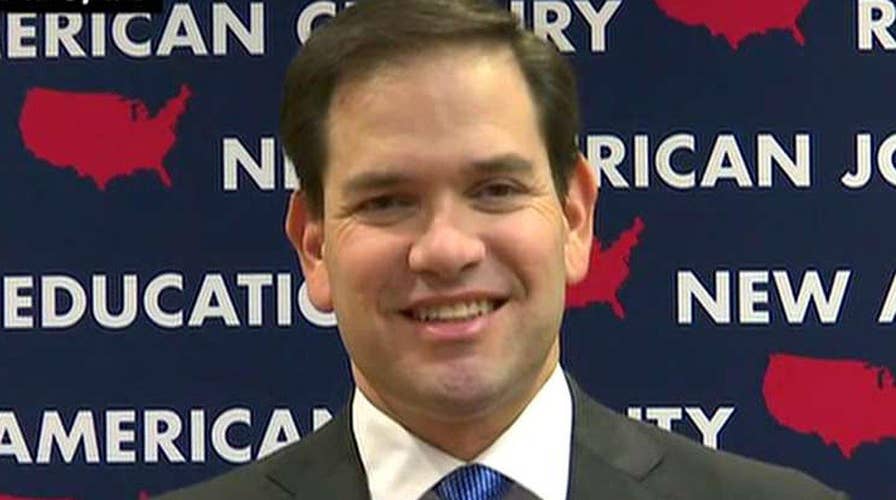Rubio: Obama obsessed with undermining the Second Amendment
2016 candidate sounds off on president's planned executive action on guns on 'America's Newsroom'
President Obama on Tuesday will formally announce plans to expand background checks and make other changes to America's gun rules via executive action, going around Congress and fueling allegations of executive overreach.
At the centerpiece of Obama's plan is a more sweeping definition of gun dealers that the administration hopes will expand the number of gun sales subject to background checks. At gun shows, websites and flea markets, sellers often skirt that requirement by declining to register as licensed dealers, but officials said new federal guidance would clarify that it applies to anyone "in the business" of selling firearms.
Obama's actions, detailed by the White House Monday, mark a renewed bid by the president to enact gun control measures with or without Congress.
Republicans accused the president of going too far, and already have threatened to fight the new measures by withholding DOJ funding. The guidance, though, aims to achieve a long-time administration goal of at least narrowing the so-called gun show loophole.
Under current law, only federally licensed gun dealers must conduct background checks on buyers, but many who sell guns at flea markets, on websites or in other informal settings don't register as dealers. The ATF has issued updated guidance that says the government can consider someone a gun dealer regardless of where the guns are sold.
In an attempt to prevent gun purchases from falling through the cracks, the FBI will hire 230 more examiners to process background checks, the White House said.
The FBI has a computerized system that can process background checks for many in seconds, but in instances where the FBI needs more time, the government only has three days before prospective buyers can return and buy the gun without being cleared.
Earlier Monday, Obama vowed to press ahead with new executive actions on gun control after meeting with top law enforcement officials, claiming he has the “legal authority” to act – and defying congressional critics who say he’s pursuing a “dangerous” overreach.
The president spoke after meeting with Attorney General Loretta Lynch, FBI Director James Comey and other top officials to review their proposals and finalize his plans.
Obama said their recommendations are “well within my legal authority” and would be supported by “the overwhelming majority of the American people, including gun owners.”
“The recommendations that are being made by my team here are ones that are entirely consistent with the Second Amendment,” Obama said, claiming they could “potentially save lives.”
The revived push to tighten America’s gun laws via executive action, however, has resulted in a backlash on Capitol Hill and the campaign trail.
Republicans made clear they would fight the administration and accused the president of overstepping.
"While we don’t yet know the details of the plan, the president is at minimum subverting the legislative branch, and potentially overturning its will,” House Speaker Paul Ryan, R-Wis., said in a statement. “This is a dangerous level of executive overreach, and the country will not stand for it.”
Rep. John Culberson, R-Texas, who chairs a key appropriations panel, warned Lynch on Monday that he would “use every tool at my disposal to immediately restrict” DOJ funding if the department proceeds with “new restrictions on our Constitutional rights.”
Republican presidential front-runner Donald Trump vowed to reverse any such actions if he’s elected.
"We're not changing the Second Amendment," Trump said Saturday at a campaign rally in Biloxi, Miss. "I will veto that. I will un-sign that so fast."
While Obama took heat from Republicans, supporters of stronger action on gun control applauded the president’s new push.
"We definitely think there are things he can do," said Dan Gross, president of the Brady Campaign to Prevent Gun Violence, which advocates for expanding background checks. Gross says his recent conversations with White House aides have left him hopeful.
"It's very clear that the White House is feeling emboldened," he said.
Obama announced the meeting with Lynch in his weekly address from his Hawaii holiday vacation. On Thursday, he'll take his argument to prime time, participating in a town hall discussion of gun violence on CNN. He's slated to make his case for changes in his State of the Union address on Jan. 12.
The high-profile rollout reflects a White House continuing to look for ways to wrap up unfinished business despite an uncooperative Congress.
After all but ignoring the issue in his first term, Obama changed course after the mass shooting at Sandy Hook Elementary in December 2012. Nevertheless, the president failed to push a package of gun measures through Congress, including one expanding background checks.
At the same time, Obama took nearly two dozen executive actions to tighten gun laws, but left a major expansion of background checks out of the mix.
But after the shooting at a community college in Roseburg, Ore. in October, Obama ordered his staff to redouble the effort to look for ways to work around Congress.
Under current law, federally licensed firearms dealers are required to seek background checks on potential firearm purchasers. But advocacy groups say many sellers are currently exempt from having to register, increasing the chance of sales to customers prohibited by law from purchasing a gun.
The Associated Press contributed to this report.






















